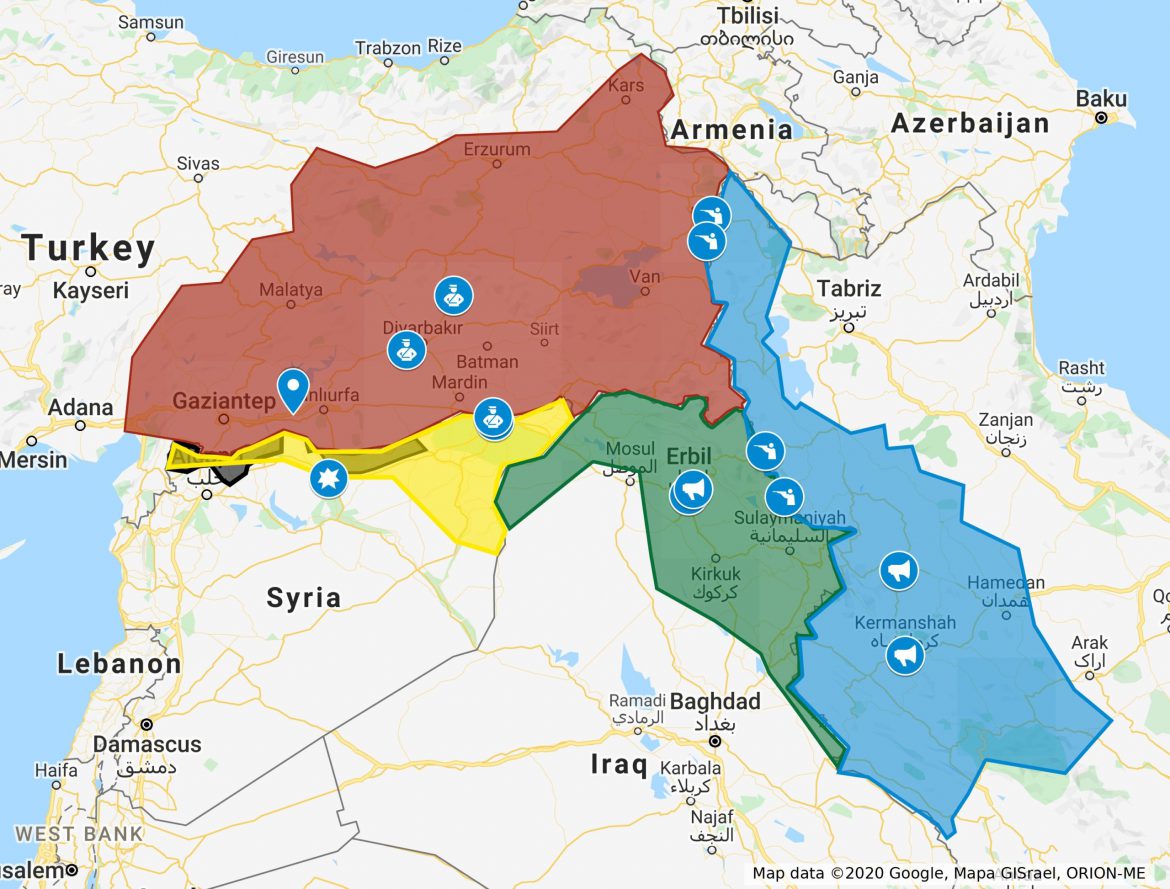1.8K
Iran
- Many of Iran’s Kurdish cities experienced anti-government protests last week. In both Sanandaj and Kermanshah, Kurds took to the streets immediately after hearing of renewed protests in Tehran. The protesters were mostly university students who chanted slogans against Iranian Supreme Leader Ali Khamenei similar to those heard during the November 2019 protests. As in previous cases, Iranian authorities responded to the most recent demonstrations by occupying Kurdish cities and cracking down on protesters. On Saturday and Sunday, dozens of Kurds were arrested in Kermanshah and Sanandaj according to Siawesh Hayati, head of a Kurdish political organization based in the Yarresan region. Meanwhile, another Kurd missing since the November protests was found dead in Tehran. Sardar Azami was originally from Kermanshah but working in Tehran when he began participating in demonstrations and was abducted by Iranian authorities. Azami’s family found his corpse in a Tehran morgue after an exhaustive search that went on for several months. Several other Kurds remain missing after taking part in anti-government protests in the Kurdish region.
- The Iranian regime killed one Kurdish border porter (Kolbar) and wounded four more last week. 25-year-old Khader Benwa died after being shot by Iranian border guards 10 days ago near Sardasht. Iranian authorities also wounded Kolbars in Mako, Chaldiran, Sardasht, and Piranshahr. The Kolbar wounded in Chaldiran, who remains unnamed, was shot by Iranian border guards on Thursday and is in serious condition.
Iraq
- The Iranian missile attack on a base hosting US personnel in Erbil resulted in no casualties or property damage and was followed by several communications between US and Kurdish officials, including a phone conversation between Secretary of State Mike Pompeo and the Prime Minister of Kurdistan Region Masrour Barzani. Likewise, US Assistant Secretary for Near Eastern Affairs David Schenker traveled to Iraqi Kurdistan and met with Kurdish officials and representatives from the Kurdistan Democratic Party (KDP) and the Patriotic Union of Kurdistan (PUK). The talks addressed the Iranian attacks and the continuing presence of US forces in Iraq. The President of Kurdistan Region Nechirvan Barzani then held a press conference and stressed it was not the “right time” for US forces to leave the country. The acting Prime Minister of Iraq Adel Abdul Mahdi also visited the Kurdistan region and met with Kurdistan Regional Government (KRG) officials in Erbil and Sulaymaniyah to discuss the recent escalation between the US and Iran in Iraq and how to solve ongoing disputes between Baghdad and Erbil.
- A KRG spokesperson responded to Hezbollah Secretary General Hassan Nasrallah’s comments on the former President of Kurdistan Region Massoud Barzani by criticizing Nasrallah and describing his remarks as “childish.” The spokesperson then released a statement which exclaimed, “The Peshmerga forces defended Erbil and the Kurdistan region, not others!” Nasrallah previously said Barazni should be thankful for Qasim Soleimani’s help in preventing Erbil’s fall to ISIS (Da’esh) when “no one else helped but Iran,” though he also described Barzani as “shaking from fear” when Da’esh threatened the Kurdish region, which prompted the aggressive rebuttal from the KRG and Office of the President of Kurdistan Region. “You who have not seen the sunlight years ago and hide in the basements, insult and mock the heroic people [of Kurdistan],” read the KRG response.
Syria
- The Chief of the National Intelligence Organization of Turkey Hakan Fidan met with his Syrian counterpart in Moscow for the first time since the Syrian Civil War began in 2011. The two sides discussed potential collaboration against Syrian Kurdish forces. Meanwhile, the Turkish incursion into Syria’s Kurdish region continued with Turkey’s jihadist proxies launching several attacks on Kurdish villages in the vicinity of Ain Essa and Turkish drones and planes carrying out an increasing number of reconnaissance operations in the area. The Syrian Democratic Forces (SDF) responded by accusing Turkey of expanding their invasion in the region. SDF General Commander Mazloum Abdi went so far as to accuse Turkey’s President Recep Tayyip Erdogan of being the actual supreme leader of the Muslim Brotherhood and state he considers Erdogan responsible for all Ikhwan-linked terrorist organizations in the region. On another note, joint Russian-Turkish patrols continued in northeastern Syria amid the failed ceasefire between Turkish-backed groups and the region’s Kurds, as additional Russian vehicles and military equipment entered Qamishli last week.
Turkey
- The Turkish government continued its ongoing crackdown on Turkey’s Kurdish communities and Kurdish politicians last week. In Diyarbakir Province’s Lice District, Turkish police detained dozens of Kurds, including two People’s Democratic Party (HDP) members of the Metropolitan Municipality of Diyarbakir. In Mardin Province’s Nusaybin District, authorities arrested a total of 10 people in several villages, including a prominent Assyrian priest, and accused them of “membership of a terror organization.” Concurrently, Diyarbakir city’s recently appointed pro-government trustee mayor fired all of the previous administration’s mayoral staff. Lastly, Diyarbakir Province’s pro-government governor replaced two elected council members with government-approved trustees in Baglar.

